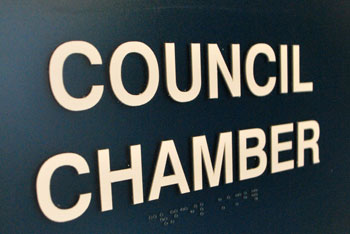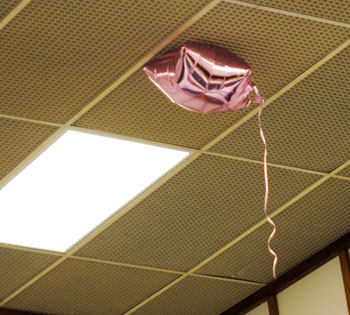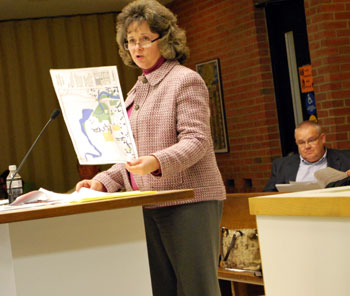Aug. 8, 2013 Ann Arbor Council: Final
The Ann Arbor city council’s meeting on Thursday – shifted from its usual Monday slot due to the Democratic primary elections held on Tuesday – marks the beginning of a transition. After serving 14 years on the city council, Marcia Higgins will represent Ward 4 for just seven more meetings, counting Thursday. Jack Eaton prevailed on Tuesday and will be the Ward 4 Democratic nominee on the Nov. 5 ballot. He is unopposed.

The new sign on the door to the Ann Arbor city council chamber, installed in the summer of 2013, includes Braille.
The council’s agenda for Thursday includes a relatively uncontroversial downtown development project. It’s also dominated by several items that relate to the way people move around inside the city. Some other agenda items relate to land outside the city.
Four different items appear on the council’s agenda related to developer Tom Fitzsimmons’ Kerrytown Place project – an 18-unit townhouse development proposed for the site of the former Greek Orthodox church on North Main Street. Nestled between Main Street on the west and Fourth Avenue on the east, the project is divided into two pieces – the Main Street frontage and Fourth Avenue frontage. Each piece of the project includes a rezoning request and a site plan proposal – and each of those constitutes an agenda item unto itself. The rezoning requested is from PUD (planned unit development) to D2 (downtown interface).
Three items relate to a piece of infrastructure closely associated with people walking as a way to get around town – sidewalks. Two resolutions involve the acceptance by the city of easements for sidewalks – one as part of a mid-block cut-through for The Varsity, a residential high-rise downtown, and the other in connection with a Safe Routes to School project near Clague Middle School on the city’s northwest side. Another sidewalk on the agenda with a school-related theme is a request for the council to approve a $10,000 design budget for about 160 feet of new sidewalk near King Elementary School, which would allow for a mid-block crosswalk to be moved to a four-way stop intersection.
More people might be able to get around the downtown and University of Michigan campus area by bicycle – if the council approves the use of $150,000 from the alternative transportation fund as requested on Thursday’s agenda. The money would provide the local match on a $600,000 federal grant obtained by the Clean Energy Coalition to establish a bike-sharing program through B-Cycle.
Getting around inside the city this fall will include the annual wrinkles due to University of Michigan move-in – and those traffic control measures are included in the council’s consent agenda. New this year will be additional traffic controls around Michigan Stadium on football game days – including the closure of Main Street between Pauline and Stadium Blvd. for a period starting three hours before kickoff until the end of the game. At its Thursday meeting, the council will be asked to give approval of the football game day traffic controls.
In matters outside the city, the council will be asked to authorize the receipt of $202,370 from the Federal Farm and Ranch Land Protection Program (FRPP) to help the city purchase of development rights on land in Lodi Township, southwest of the city. That federal grant comes in connection with the city’s greenbelt program. The council will also be asked to confirm the nomination of John Ramsburgh to the greenbelt advisory commission.
Also on the council’s agenda is the extension of a contract for the city’s part-time public art administrator through the end of the year – to handle projects in the works at locations the Kingsley rain garden, East Stadium bridges, and Argo Cascades.
Added to the agenda late, on Tuesday, is a resolution that calls upon the state legislature to repeal Michigan’s version of a “stand your ground” law as well as to repeal legislation that prevents local municipalities from regulating the sale, transfer, transportation, or possession of firearms and ammunition. The agenda item comes in response to public commentary after the verdict in the Trayvon Martin case was handed down in mid-July.
Details of other meeting agenda items are available on the city’s Legistar system. Readers can also follow the live meeting proceedings on Channel 16, streamed online by Community Television Network.
The Chronicle will be filing live updates from city council chambers during the meeting, published in this article “below the fold.” The meeting is scheduled to start at 7 p.m. [Full Story]





